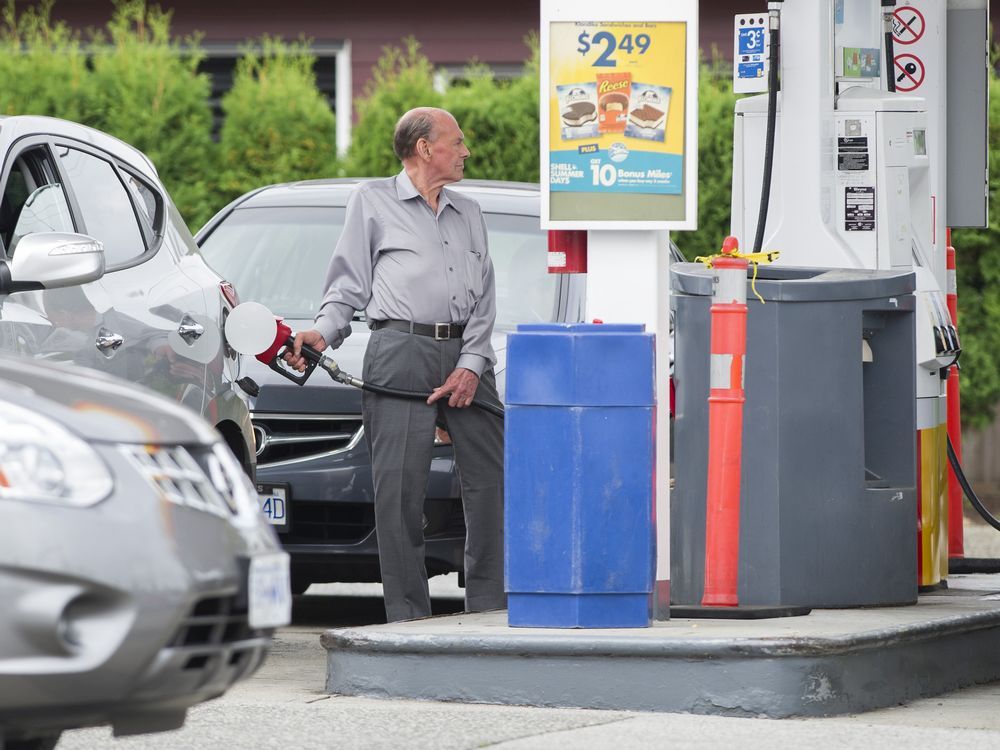Vaughn Palmer: Inquiry confirms B.C. motorists getting hosed at pumps via big markups

Credit to Author: Stephen Snelgrove| Date: Sat, 31 Aug 2019 15:06:03 +0000
VICTORIA — Premier John Horgan got the answer he was looking for Friday, via a report from the inquiry into gasoline prices that said British Columbians were being overcharged at the pump by almost half a billion dollars a year.
The B.C. Utilities Commission delivered that finding in a 100-plus page report that deftly cut through the complexities of the gasoline marketplace.
The inquiry found no evidence of collusion in fixing prices. But it did find the industry was behaving like an oligopoly, with a limited number of players and less than competitive pricing of the product.
Bottom line: there is an unexplained markup of 13 cents per litre on gasoline in southwestern B.C., and six cents in the northern part of the province.
Moreover, for the market in and around Vancouver, the markup is determined on the basis of what inquiry chair David Morton called a “tail wags dog” calculation.
Only about three per cent of the region’s gasoline supply comes from the U.S. Pacific Northwest. But the spot market in Seattle is used to price the remaining 97 per cent.
The inquiry reached this conclusion while finessing the NDP requirement that it “not inquire into the effects of provincial enactments or policy on gasoline and diesel prices in B.C.”
It simply ignored the edict, even acknowledging the workaround when calculating the price impact of provincial regulations governing the carbon content of fuel.
“Though looking into the effect of provincial enactments is out of the scope of this inquiry,” wrote Morton and the other two members of the panel, “we estimate the cost of the low carbon fuel standards so we can determine any unaccounted for differences between Vancouver and Seattle prices.”
Likewise, they discounted the significant difference in taxes between the two jurisdictions, and made allowances for transportation costs and exchange rates.
Only then did they come up with 13-cents per litre as the unjustified “premium” on gasoline prices in Metro Vancouver.
“People feel like they’re being ripped off when they fill up at the gas station — and they’re right,” said cabinet minister Bruce Ralston in thanking the commission for its efforts.
“Today, the BCUC found that the wholesale gasoline market is not truly competitive, which results in unexplained higher gas prices for consumers, and potentially higher profits for oil and gas companies.”
Having gotten the hoped-for evidence of “gouging,” what were the New Democrats going to do about it?
Ralston seized on the inquiry’s closing call for the industry to be given a month to respond to the explosive accusations in the report.
“The inquiry panel is cognizant of the limited time throughout the summer period for participants to provide information and participate,” wrote Morton and his colleagues, acknowledging the three-month time frame imposed by the cabinet.
Ralston said he would take the recommendation to cabinet in anticipation that the inquiry would be given a 30-day extension to hear from the industry and perhaps revise its own findings.
Only then will the cabinet begin to consider the what-is-to-be-done part of the report.
On that score, the inquiry seemed more certain about the unjustified markups on gasoline prices than it was about how to rein them in.
The report acknowledges how B.C. has been receiving reduced shipments of gasoline through the fully-booked Trans Mountain pipeline.
But in the absence of a change in allocation rules, the inquiry said there is no guarantee B.C. would receive more gasoline through a twinned version of the line.
Still, supporters of the Trans Mountain expansion project had to be heartened by a recommendation that said: “The B.C. government should ensure there is infrastructure for more refined product to flow to B.C.”
The supply problem could also be addressed by increasing the province’s refining capacity and/or by building more storage and delivery terminals.
But there were huge economic, environmental, regulatory and political obstacles to those options, as the panel readily acknowledged.
Perhaps the most promising option would be some form of gasoline price regulation, modelled on what has been done in New Brunswick and other provinces.
A B.C. regulator could cap the markup that would be allowed above the spot price in the Seattle market.
The inquiry calculated that two cents of the current 20-cent-a litre mark-up would be justified to cover costs of transportation by barge. It allowed four cents to cover B.C.’s low carbon fuel standards and another penny for other considerations.
That left the remaining 13 cents as unjustified in the absence of further explanation from the industry. Applying that approach to future pricing schemes, a regulator like the BCUC might require the industry to justify any markup beyond seven cents.
But in considering that and other price-fixing schemes, the inquiry noted the potential for unintended consequences in a complex industry with a half-dozen wholesalers, 1,300 retail outlets, and many different business models.
“If price regulation negatively affects one, its losses are less likely underwritten by the profits of others,” warned Morton and his colleagues on the inquiry panel.
“The scope of the inquiry was not sufficient to determine if such an approach would be of benefit,” they added in reminding the cabinet of the rush-job aspect of the assignment. “This needs to be approached with caution.”
So it does. But having assembled the evidence, the New Democrats will have to at least try to stop what they have already characterized as a half-a-billion-dollar-a-year rip-off at the pump.
CLICK HERE to report a typo.
Is there more to this story? We’d like to hear from you about this or any other stories you think we should know about. Email vantips@postmedia.com